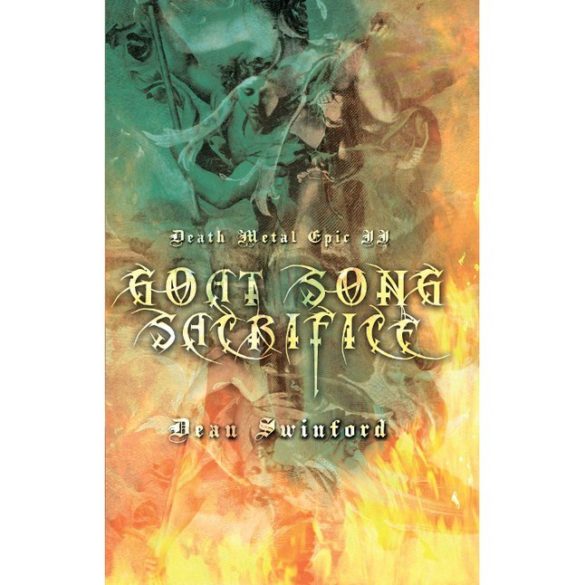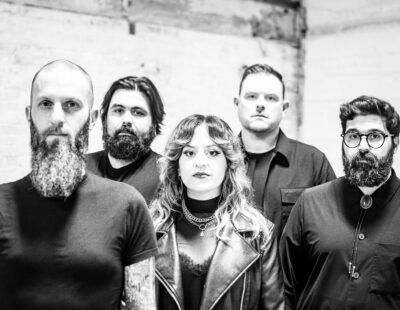
Dean Swinford is an Associate Professor of English at Fayetteville State University and a long-time fan of metal. His Death Metal Epic Book I: The Inverted Katabasis was featured on the Decibel website way back in 2013. Book II: Goat Song Sacrifice, is available now. Finally.
Tell us a little about how and why you came up with the concept of the “Death Metal Epic.”
Basically, I wanted to make books that I’d pick up if I saw them. I want them to be tight and funny, and also have ideas and characters that stick with readers. As a guy, I have a hard time finding books about things I’m into, but with more depth than, like, 2 Fast 2 Furious. So, I guess I’m writing books for people who feel the same way.
How did you hook up with ATLATL [Press]? They’ve got some heavy hitters in the Bizarro genre (Andersen Prunty, D. Harlan Wilson, C.V. Hunt) and it’s a genre known for being ‘out there.’ On the face of it, one might assume that a trilogy under the banner of Death Metal Epic would include all manner of offending grotesquery but your novels are much more grounded in reality.
I got in touch with them because of Wilson’s They Had Goat Heads. He had also published stuff in The Café Irreal, a journal I wrote some essays for, so I hoped ATLATL would be open to what I was doing. I’m stoked to work with ATLATL. People who like Death Metal Epic should check out Prunty’s Squirm With Me—it covers the whole lit/ comic convention culture in some pretty funny ways.
Yeah, it’s a conscious decision to ground the books in reality. When I write, I’ll listen to Absu’s Tara or Purtenance’s …To Spread the Flame of Ancients, then watch Gilmore Girls or Arrested Development at night. My internal world is like Stars Hollow with Proscriptor as the town troubadour.
Given your academic background and status, is being a fan of death metal something of a “secret life” for you or do you openly let your freak flag fly?
The cool thing is that there’s a big community of metal academics, so I see it as a plus. My fiction is definitely informed by my academic research—the band name Astrampsychos, for example, comes from an ancient book of dream interpretation I worked with while writing Through the Daemon’s Gate. A lot of medievalists focus on some kind of pop culture subject—MRPGs or Game of Thrones are pretty popular right now. You kind of have to so you can explain how the Middle Ages are relevant to students.

I recently devoured both The Inverted Katabasis and Goat Song Sacrifice, and although I understand the constraints you’re under, I dread thinking it may take another four years to feast my eyes upon Sinister Synthesizer. Is there anything you can tease us with as to the direction it might head?
Each book focuses on different metal subgenres. The Inverted Katabasis deals with the death metal underground, Goat Song Sacrifice presents black metal’s ascendancy from a point of view that differs from the often-told Norway story, and Sinister Synthesizer will show the splintering and blending of genres that you see on albums like Ulver’s Kveldssanger or Beherit’s Electric Doom Synthesis. I generally start listening more and more to whatever sound I’m exploring in a particular book when I start writing, so my first step for the next book is to build up the tolerance for repeated listens to Burzum’s Casio albums in their entirety. Also, a character might die.
Do you think your other works would appeal to Death Metal Epic fans? Some of them have rather heady and academic-sounding titles, but I’ve got to say that Through the Daemon’s Gate: Kepler’s Somnium sounds intriguing.
Sure—probably the most appealing to metal fans would be “Mask of the Medieval Corpse: Prosopopoeia and Corpsepaint in Mayhem’s De Mysteriis Dom Sathanas” in the journal Studies in Medievalism. It looks at the way that Dead described corpsepaint as a way to make himself like the corpse of a plague victim and the ways that Dead’s conceptualization of corpsepaint and many of the lyrics on De Mysteriis use the rhetorical trope of prosopopoeia, a kind of personification that involves speaking to or through the dead. I analyze the lyrics in relation to current research by medievalists on ways that contemporary pop culture more broadly configured speaks to and through the Middle Ages.
Through the Daemon’s Gate has an intentionally metal-themed title. It’s about Johannes Kepler’s Somnium, a really weird work by the astronomer that many critics see as the first work of science fiction.
Decibel has dubbed 2017 “The Year of Death Metal.” You’ve had Crypt Sermon in heavy rotation in your “writing dungeon.” Are there any particular releases you are looking forward to or favorites that have come out in the recent months?
Yes—their “De Mysteriis” cover is amazing. Plus, I love that kind of sound. In terms of death metal, the new Incantation album should be good. I also listen to a lot of bands that keep the old school flame burning—Krypts, Blaspherian, Soulskinner. That War Master album Pyramid of the Necropolis is a great writing soundtrack.
Have you done much traveling? I ask because your protagonist/anti-hero David Fosberg, aka Azrael, travels the globe in search of band and music (and love) and I was wondering how much, if any, of the globe-hopping is based on your own experiences as opposed to research or just simply a product of creativity? For that matter, how much of the story is based on your own experiences? Are you David Fosberg?
Yeah, all the traveling comes from my own experiences. I lived in Belgium as a Fulbright scholar in 2002-03 while I was writing Through the Daemon’s Gate. I did a couple of semesters of study abroad in England when I was in college, and those experiences got me hyped on traveling.
The story has elements from my own experiences, but it’s also heavily fictionalized. I had a band sort of like Katabasis, but it didn’t move much beyond the demo tape stage.
My friends say that David Fosberg sounds like me—that the lines are things I would say. When I write him, though, I try to imagine how I might have reacted to things when I was 22 or something like that. It’s possible I just haven’t matured much past that point, though.
You can purchase Death Metal Epic through Amazon or the publisher.






